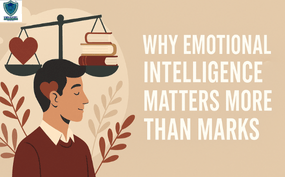Blog Details

17May
Why Emotional Intelligence Matters More Than Marks
In an education-obsessed culture where marks are often the gold standard of success, the role of emotional intelligence (EI) is frequently overlooked. While academic scores may help students gain admission to prestigious institutions, emotional intelligence is what enables them to thrive—personally, academically, and professionally. This article explores why EI is not just an important skill but arguably more crucial than academic performance in determining long-term success.
Understanding Emotional Intelligence
Emotional Intelligence refers to the ability to recognize, understand, manage, and use emotions effectively—both one’s own and those of others. Psychologist Daniel Goleman popularized the concept, breaking EI down into five components:
- Self-awareness: Recognizing one’s emotions and their impact.
- Self-regulation: Managing emotions in healthy ways.
- Motivation: Using emotions to pursue goals with energy and persistence.
- Empathy: Understanding the emotions of others.
- Social skills: Managing relationships, inspiring others, and navigating social environments.
The Limitations of Marks
Academic grades are often used as shorthand for intelligence, capability, and future potential. But this narrow metric overlooks critical skills such as creativity, collaboration, resilience, and communication. Some limitations of using marks as the sole measure of success include:
- Marks don’t reflect emotional maturity or interpersonal skills.
- High scorers may struggle with real-world challenges that require collaboration and adaptability.
- Overemphasis on marks can lead to stress, anxiety, and burnout.
- Many successful professionals were average students who excelled later due to their people skills and self-awareness.
Emotional Intelligence in Real Life
EI affects almost every domain of life:
- Academic Performance: Studies have shown that students with higher emotional intelligence perform better in school. Why? Because they can manage stress, build better relationships with peers and teachers, and maintain motivation.
- Career Success: In the workplace, technical skills and intelligence get you in the door, but EI determines how far you go. Leadership, teamwork, and customer service are all deeply rooted in emotional skills.
- Relationships: Healthy relationships with family, friends, and colleagues rely on empathy, communication, and conflict resolution—all pillars of EI.
- Mental Health: Individuals with high EI are better equipped to handle life’s ups and downs. They tend to be more resilient and less prone to depression and anxiety.
The Science Behind EI
Research backs up the importance of EI:
- According to a study by Talent Smart, EI is responsible for 58% of performance in all job types.
- People with high EI earn an average of $29,000 more annually than those with low EI.
- A Yale University study found that students with higher EI had better classroom behaviour and academic outcomes.
Teaching EI to Children and Teens
Parents and educators play a crucial role in developing emotional intelligence. Here are some strategies:
- Model emotional awareness: Express your feelings in healthy ways so children learn by observation.
- Encourage open communication: Create a safe space where emotions can be discussed.
- Teach problem-solving: Help children navigate social conflicts instead of solving them for them.
- Practice mindfulness: Techniques like deep breathing and meditation help with emotional regulation.
- Praise effort, not just outcome: This builds intrinsic motivation and resilience.
Balancing Marks and Mindset
While EI is crucial, this isn’t to say academic achievement should be dismissed. Rather, parents and students should strike a balance:
- Prioritize emotional well-being alongside academic goals.
- Focus on learning and growth, not just outcomes.
- Celebrate social and emotional victories as much as academic ones.
Tools and Resources
- Books: "Emotional Intelligence" by Daniel Goleman, "Raising an Emotionally Intelligent Child" by John Gottman.
- Apps: Headspace, Calm, Mood Meter (Yale Centre for Emotional Intelligence).
- Programs: SEL (Social and Emotional Learning) programs are increasingly being integrated into school curricula.
Conclusion:
In a world that values high scores and academic trophies, it’s essential to remember that emotional intelligence often determines the quality of our relationships, the resilience we show in hard times, and the compassion we offer others. Marks may open doors, but emotional intelligence helps you walk confidently through them and succeed once you’re inside. For students and parents alike, investing in EI is not just wise—it’s vital.
FAQ’s
What exactly is Emotional Intelligence (EI)?
Emotional Intelligence refers to a person’s ability to recognize, understand, manage, and respond to emotions—both their own and others’. It includes skills such as empathy, self-awareness, emotional regulation, motivation, and social skills.
How is Emotional Intelligence different from IQ or academic intelligence?
IQ measures cognitive abilities like logic, reasoning, and problem-solving. EI, on the other hand, measures emotional and interpersonal skills. While IQ might help you get a job, EI often determines how well you perform in that job, especially in leadership, teamwork, and communication.
Why should parents care about EI more than grades?
Grades are temporary achievements; EI is a lifelong skill. Emotionally intelligent children are better equipped to handle stress, form strong relationships, and bounce back from failure—all crucial for long-term happiness and success.
Can emotional intelligence be taught or improved?
Yes, EI is not fixed like IQ. It can be nurtured and developed over time through conscious practice, role modelling, emotional coaching, and structured programs like Social-Emotional Learning (SEL).
Do schools focus enough on EI development?
Many traditional schools still prioritize academic performance. However, progressive institutions and education boards are beginning to integrate SEL programs that focus on empathy, conflict resolution, and mindfulness into the curriculum.
Our Office: West Bengal, Maharashtra & Delhi.
For More Infomation about admission in Medical, Engineering, Management & Study in Overseas Details.
View Current Study Overseas, Medical, Engineering & Management Admission Details Video.





